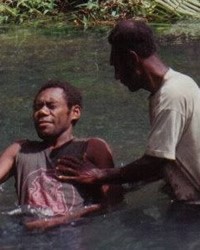Only about 10% spoke any Pidgin (men and boys) and they had no written language and no literates until they began requesting missionaries to come help them in the early 1980s and the first families moved into the village of Miupak in 1988. An alphabet was provided and literacy began among them for the first time in 1991. From the 3rd class on, they took control of teaching literacy and continue to do so. The New Testament was printed in the Miu language in 2003 and they also have Genesis and Jonah finalized and in print with other materials in process.
They are located in the Whiteman Mountain Range, on the southern side, in West New Britain Province.
They live, mostly, in small hamlets of about 4-6 families, in thatched huts, cooking on open fires. They are subsistence farmers, growing taro (their staple), sweet potatoes, cassava, greens, cucumbers, papaya, pineapple, bananas and pumpkins. They have little chance to earn "cash money" -- but can sell one of their pigs (raised by the women) when money is needed. Some of the men hunt -- with very long blowguns. In dry season they can poison and gather small fish and shrimp from the streams.
Traditionally they are animistic; however, now most of them are Christian. They have local churches led by Miu Bible teachers serving a 45-minute walking radius.
They need a higher level of discipleship. Resident missionaries left in 1990 and input has been sporadic since then. They have had some training in making outlines for Bible lessons in the epistles, but not much in how to "flesh them out." They also need a dependable supply of medicines (some are trained to dispense the common oral and topical medicines.)
Continued spiritual growth.
Accountability.
Access to medical help (hospitals and doctors) for critical cases.
Scripture Prayers for the Myu in Papua New Guinea.
| Profile Source: Anonymous |










